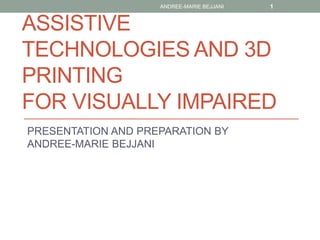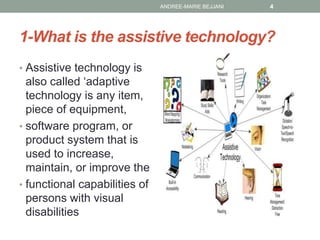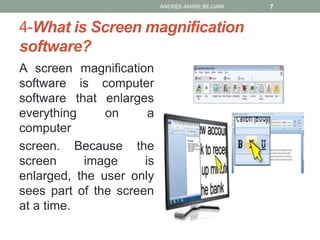ASSITIVE TECHNOLOGIES-ANDREE-MARIE BEJJANI.pptx
- 1. ASSISTIVE TECHNOLOGIES AND 3D PRINTING FOR VISUALLY IMPAIRED PRESENTATION AND PREPARATION BY ANDREE-MARIE BEJJANI ANDREE-MARIE BEJJANI 1
- 2. PLAN 1-What is the assistive technology? 2-Who are the users of assistive technology? 3-What is screen readers software? 4-What is Screen magnification software? 5-What is SAFA : Screen Access for All? 6-What is Low Vision Devices Kit? 7-What is RUBY (Handheld Video Magnifier)? 8-What is Plex talk device? 9-What is Keyboard Learning Software? 10-What is OCR Scanning Software? 11-What is A Braille Note Taker machine ? 12-What is Index Braille BasicD V4 Printer? 13-What is Kibo XS device? 14-What is PEARL Camera? 15-What isWeb Accessibility Initiative (WAI)? ANDREE-MARIE BEJJANI 2
- 3. PLAN 16-what is 3D printing? 17-How does 3D printing work? 18- What is the steps of 3D printing? 19- Why 3D printing in library? 20-3D printing in San Mateo County Libraries? 21- 3D Printing in the Denver Public Library ideaLABs? 22-What is the benefits of 3D printing for visually impaired? 23-conclusion? 24-bibliographic references? ANDREE-MARIE BEJJANI 3
- 4. 1-What is the assistive technology? ŌĆó Assistive technology is also called ŌĆśadaptive technology is any item, piece of equipment, ŌĆó software program, or product system that is used to increase, maintain, or improve the ŌĆó functional capabilities of persons with visual disabilities ANDREE-MARIE BEJJANI 4
- 5. 2-Who are the users of assistive technology? Visually impaired and blind users in library use the assistive technologies to facilitate their reading and writing like applications such as 1-braille 2- talking books, 3-telesensorum variable 4-speech control recorder, 5-screen reader softwares, 6-screen magnification software,scanning and 7-reading appliances, 8- audio library system, 9- tactile graphics, 10-3D Printing ANDREE-MARIE BEJJANI 5
- 6. 3-What is screen readers software? A screen reader is a software program that allows blind and low vision individuals to read the content on a computer screen with a voice synthesizer or braille display. The screen reader is the interface between the user and the computer operating system and its applications ANDREE-MARIE BEJJANI 6
- 7. 4-What is Screen magnification software? A screen magnification software is computer software that enlarges everything on a computer screen. Because the screen image is enlarged, the user only sees part of the screen at a time. ANDREE-MARIE BEJJANI 7
- 8. 5-What is SAFA : Screen Access for All? screen access for all (SAFA) is an open source initiative to develop a screen reading software for the vision impaired persons to read and write in their language of choice. ANDREE-MARIE BEJJANI 8
- 9. 6-What is Low Vision Devices Kit? This low vision devices kit is designed for the professionals starting low vision careThis kit contains optical devices, filters,nonoptical devices, vision stimulation materials visual acuity charts for distance and near & Electronic Magnifiers. ANDREE-MARIE BEJJANI 9
- 10. 7-What is RUBY (Handheld Video Magnifier)? The RUBY handheld video magnifier is small and lightweight enough to fit into a pocket or purse, yet provides the magnification you need to help you read or see details, whether you are at library or home or work ŌĆó ANDREE-MARIE BEJJANI 10
- 11. 8-What is Plex talk device? Plex talk device is DAISY(Digital accessible information system (DAISY) is a technical standard for digital audiobooks, periodicals, and computerized text) Book player, Mp3 Player and voice recorder ANDREE-MARIE BEJJANI 11
- 12. 9-What is Keyboard Learning Software? TypeAbility Keyboard learning Software is a typing and computer program for students using JAWS (screen reader) or MAGic (magnification software). This program will help students master keyboarding skills, including all the letters, and punctuation; students will also learn how to navigate and edit within dialog boxes and text documents ANDREE-MARIE BEJJANI 12
- 13. 10-What is OCR Scanning Software? Optical Character Recognition systems are one of the tools that allow people who are blind or visually impaired to access printed information,There are three essential elements to these systems: scanning, optical character recognition, often referred to as OCR, and the reading of the text via synthesized speech. To use this technology, users require three components: a flatbed scanner, a PC with a compatible sound card, and a specialized OCR software program with speech output. t. ANDREE-MARIE BEJJANI 13
- 14. 11-What is A Braille Note Taker machine ? A Braille Note Takeris a specialized computer that can both accept input or commands in Braille and output the results in Speech and Braille. It is primarily used by those who are blind ANDREE-MARIE BEJJANI 14
- 15. 12-What is Index Braille BasicD V4 Printer? Braille printers receive data from computer devices and emboss that information in braille onto paper through the use of solenoids that control embossing pins. Braille printers typically print on heavyweight paper and use up more pages for the same amount of information than pages printed on a regular printer. They are also slower and noisier. Interpoint printers are printers that emboss braille on both sides of a page ANDREE-MARIE BEJJANI 15
- 16. 13-What is Kibo XS device? Kibo XS is a multi-lingual scanning & reading device that can seamlessly connect with any PC/Computer/Laptop as well any Android smartphone to read any printed or handwritten document in audio ŌĆó ŌĆó ANDREE-MARIE BEJJANI 16
- 17. 14-What is PEARL Camera? PEARL Is a portable reading solution for blind and vision-impaired users. The folding camera deploys in seconds to connect to your PC and snap a picture of your printed material with an array of human-sounding voices. ANDREE-MARIE BEJJANI 17
- 18. 15-What isWeb Accessibility Initiative (WAI)? The WAI seeks to make the internet more accessible to people with auditory, cognitive, neurological, physical, speech and visual impairments ANDREE-MARIE BEJJANI 18
- 19. 16-what is 3D printing? 3D printing also called (additive manufacturing) is a process of making three dimensional solid objects from a digital file. The creation of a 3D printed object is achieved using additive processes. Additive process, where successive layers of material are laid down in different shapes. Objects can be of almost any shape or geometry, and are produced from a 3D model or other Objects can be of almost any shape or geometry, and are produced from a 3D model or other electronic data source ANDREE-MARIE BEJJANI 19
- 21. 17- How does 3D Printing work? First step A person creates a 3D image of an item using a computer-aided design (CAD) software program. Second step The CAD information is sent to the printer third step The printer forms the item by depositing the material in layersŌĆöstarting from the bottom layerŌĆöonto a platform . In some cases light or lasers are used to harden the material. ANDREE-MARIE BEJJANI 21
- 23. 18-what is the steps of 3D printing? ŌĆó THE STEPS OF 3D PRINTING ŌĆó A-Modeling ŌĆó B-Printing ŌĆó C-Finishing ANDREE-MARIE BEJJANI 23
- 24. A -Modeling Modeling Additive manufacturing takes virtual blueprints from computer aided design (CAD) or animation modeling software and "slices" them into digital cross-sections for the machine to successively use as a guideline for printing and computer aided design animation modeling software ANDREE-MARIE BEJJANI 24
- 25. B-Printing Printing To perform a print, the machine reads the design and lays down successive layers of liquid, powder, or sheet material to build the model from a series of cross sections. These layers, which correspond to the virtual cross sections from the CAD model, are joined together or automatically fused to create the final shape. Advantage: Ability to create almost any shape or geometric feature. ANDREE-MARIE BEJJANI 25
- 26. C-Finishing ŌĆó Finishing Though the printer-produced resolution is sufficient for many applications, printing a slightly oversized version of the desired object in standard resolution, and then removing material with a higher- resolution subtractive process can achieve a higher- resolution ANDREE-MARIE BEJJANI 26
- 27. 19-Why 3D printing in library? According to a report from ALA, there are over 428 public library branches in the united states that ofer 3D printers to the public 3D printing is an example of the type of resource that is transforming today's libraries into cutting-edge learning hubs and giving communities access to technologies that are having significant impact on such fields as scientific research, architecture, manufacturing, engineering, healthcare and more ANDREE-MARIE BEJJANI 27
- 29. 20-3D printing in San Mateo County Libraries? San Mateo County Libraries have embraced 3D printing as a resource to all patrons, even transforming spaces to accommodate increasing demand and developing an online appointment system. The teamŌĆÖs mission is ŌĆ£to encourage creative failures and teach timeless skills through critical thinking, problem- solving, STEAM activities, access to technology, and fostering curiosity every step of the way.ŌĆØ Through one-on- one sessions, sharing free resources such as Thingiverse 3D design files and providing access to Tinkercad, a simple 3D design software staff inhas seen novice users produce such items as toys, maps and even prosthetic hands ANDREE-MARIE BEJJANI 29
- 31. 21- 3D Printing in the Denver Public Library ideaLABs ? The 3D printing based on reservation and the respectation of the reading of the full 3D Printer Policy with details. The 3d printing in Denver public library ideaLABs is for free and you have the permission to print anything interested wiith far in harmful thing like weapons by using a site like Thingiverse, Bld3r or use some of the lab's free modeling software like Tinkercad, Blender or SketchUp to make your own designs. ANDREE-MARIE BEJJANI 31
- 33. 22-What is the benefits of 3D printing or visually impaired? 3D printing has been introduced as an additional tool for visually impaired people, along with braille and tactile models that help them navigate the world around them using their sense of touch to facilitate learning and education. These tools all share the common characteristic of creating raised objects that visually impaired people can use to read and visualize objects, maps, drawings,game and more that they may miss out on due to their impairment ANDREE-MARIE BEJJANI 33
- 34. 23-conclusion In conclusion, assistive technologies is essential to library because they reduce the need for disabilities and enable the visually impaired to continue his education and live equalsuch as 3D increasingly being used in libraries to improve accessibility for visually impaired patrons. These technologies allow libraries to create tactile versions of books and other materials, making it possible for visually impaired individuals to access and engage with a wider range of content. Additionally, 3D printing can also be used to create other assistive devices such as braille labels and tactile maps. As technology continues to advance, it is likely that we will see more libraries incorporating these types of assistive technologies to improve accessibility and inclusivity for all patrons. ANDREE-MARIE BEJJANI 34
- 35. 24-bibliographic references Jorge, C. S., Albuquerque, P. L., & Carvalho, F. (2021). The use of 3D printing for the development of a learning tool for the visually impaired. International Journal for Innovation2_Education and Research, 9(9), 387ŌĆō398. https://doi.org/10.31686/ijier.vol9.iss9.3353 Sutar, D. B., & Hande, S. A. (2021). Assistive Technologies in Libraries for Visually Impaired Studies and Teachers. Author, G. (2017, October 9). Library 3.0: How 3D printing is helping reshape the library into a lab. Getting Smart. Retrieved January 4, 2023, from https://www.gettingsmart.com/2017/10/09/library-3-0-how-3d-printing-is-helping-reshape-the- library-to-a-lab/ Heddings, A. (2018, November 13). How does 3D printing work? How. Retrieved January 4, 2023, from https://www.howtogeek.com/362939/how-does-3d-printing-work/ Home. Bayberry Elementary School. (n.d.). Retrieved January 4, 2023, from https://bb.watchungschools.com/ How to 3D print: A step-by-step guide of 3D printing. (n.d.). Retrieved January 4, 2023, from https://www.raise3d.com/academy/how-to-3d-print-a-step-by-step-guide-of-3d-printing/ . . ANDREE-MARIE BEJJANI 35
- 36. 24-bibliographic reference Assistive Technologies and the use of the 3D printing in Libraries for Visually Impaired. Matterhackers minute // 3D printing for educating the visually impaired. YouTube. (2018, February 15). Retrieved January 21, 2023, from https://youtu.be/ZKuEkGKZJrM 3D printing- The Future of Education. YouTube. (2016, January 19). Retrieved January 21, 2023, from https://youtu.be/PdzOI7CwNIk 3D printing: Thingiverse Quick Tour. YouTube. (2021, January 14). Retrieved January 21, 2023, from https://youtu.be/htyFKG45Weg 3D printing at your library. YouTube. (2018, October 2). Retrieved January 21, 2023, from https://youtu.be/oCEt9-qFSMo ANDREE-MARIE BEJJANI 36
- 37. 24-bibliographic reference jhedstrom January 17, & Jhedstrom. (n.d.). Explore 3D printing at the san mateo county libraries. Open for Exploration tag line. Retrieved January 4, 2023, from https://smcl.org/blogs/post/explore-3d-printing-at-the-san-mateo-county- libraries/ Timeline of the 3D printing history. ASME. (n.d.). Retrieved January 4, 2023, from https://www.asme.org/topics-resources/content/infographic-the-history-of- 3d-printing UAB events calendar. The University of Alabama at Birmingham. (n.d.). Retrieved January 4, 2023, from https://calendar.uab.edu/event/uab_libraries_introductory_3d_printer_train ing_-_filament_printers What is 3D printing? - technology definition and types. TWI. (n.d.). Retrieved January 4, 2023, from https://www.twi-global.com/technical-knowledge/faqs/what-is-3d- printing ANDREE-MARIE BEJJANI 37
- 38. 24-bibliographic references Zia, M. (2022, July 13). Why 3D printing in the library? Dependable. Retrieved January 4, 2023, from https://www.3dprintingbuff.com/why-3d-printing-in- the-library/ 3D printing in the Denver Public Library idealabs. Denver Public Library. (n.d.). Retrieved January 4, 2023, from https://www.denverlibrary.org/idealab3D 3D printing and Libraries. American Libraries Magazine. (2014, June 28). Retrieved January 4, 2023, from https://americanlibrariesmagazine.org/blogs/the-scoop/3d- printing-and-libraries/ ANDREE-MARIE BEJJANI 38





































